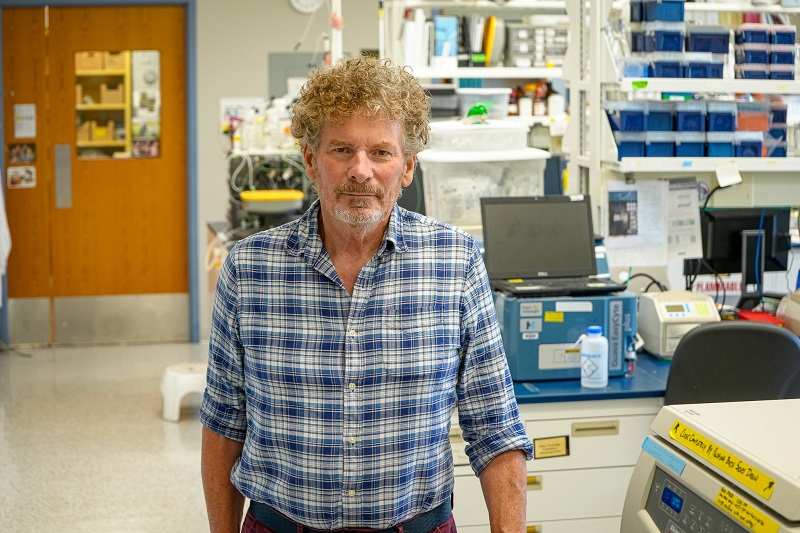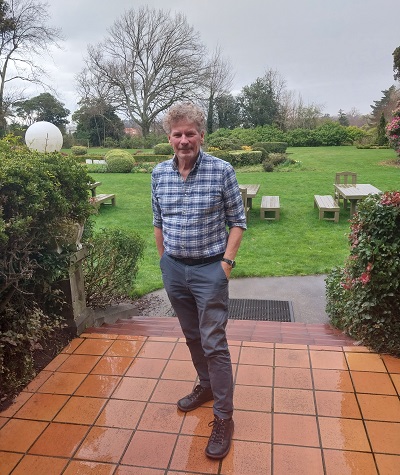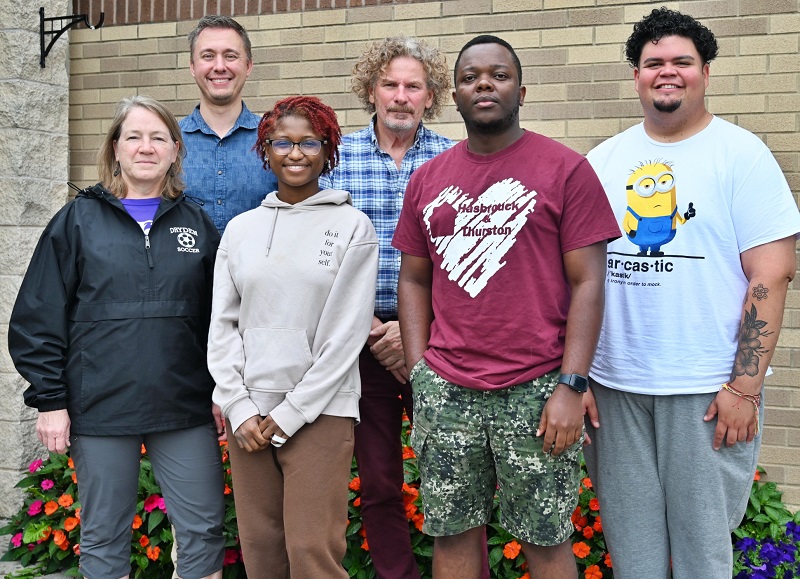
Coming home to Massey: an illustrious journey from Auckland to global virology fame
 Collin's visit to Manawatū campus in August 2023
Collin's visit to Manawatū campus in August 2023
It was a wintry day in late August when Dr Colin Ross Parrish stepped onto Massey’s Manawatū campus grounds, where he hadn’t been since his graduation more than 40 years ago. The winter weather couldn’t dampen his spirits. “I enjoyed the visit and the chance to meet the current researchers, and to check out the older buildings I used to work in while doing my honours project and also to see the newer ones... Palmerston North has also changed in many ways, but I could see one of my old flats is still standing!”
Currently serving as the John M. Olin Professor of Virology at Cornell’s College of Veterinary Medicine, his research has consistently been at the cutting edge, focusing on viral diseases and pathogenesis, virus structure, and virus evolution - including the evolution of new host ranges. To many, Colin is a paragon of dedication and excellence. But his journey, is filled with hard work and an undying love for knowledge.
Embracing the unexpected
Raised in Auckland in a non-academic household, Colin’s academic trajectory wasn’t always linear. “Neither of my parents attended university. And I wasn’t what you’d call a star student in high school. Far from it.”
When asked if he envisioned being a scientist as a child, Colin recalls, “I didn't know anyone who was a scientist. My father’s advice to me was to become an accountant.” But destiny is a curious thing. A seemingly ordinary after-school programme at the Auckland Museum became a turning point, exposing him to the wonders of science.
Life continued to surprise him. “I enrolled in the New Zealand Certificate in Science (NZCS) and worked as a technician.” This experience thrust him into the captivating domain of plant pathology. During these experiments and studies, his passion for the subject flourished, pushing him towards night classes and eventually guiding him to Massey University.
Being a Massey alumnus, Colin’s academic journey from New Zealand to the US has been remarkable. With a Bachelor of Science (First Class Honours) in Microbiology and Biochemistry from Massey, he earned a PhD in Virology from Cornell University in 1984. His postdoctoral studies took him to Monash University in Melbourne, Australia, to study flaviviruses such as dengue virus. By 1988, he was back at Cornell, joining the faculty, where he has been making monumental contributions to the field of virology ever since.
Climbing the academic ladder and contributing to virology
Colin’s achievements in the field of virology are both impressive and impactful. Holding the esteemed title of the John M. Olin Professor of Virology in the College of Veterinary Medicine at Cornell University, his specialisation lies in viral diseases and pathogenesis, diving deep into the intricacies of virus structure and their evolution. One of the crowning moments in his illustrious journey was his contribution to the ground-breaking discovery of the vaccine for Canine Parvovirus. This virus erupted in the 1970s, leading to a global disease pandemic.
His lab doesn’t just stop at basic research. They have delved into studying emerging viruses in dogs, cats, and wildlife, shedding light on diseases caused by many significant viruses. Colin and his dedicated team are pioneering research that traces the pathways of these viruses, identifying how they adapt and transfer between species, such as from dogs to cats and even to wild creatures like raccoons and foxes.
Collin reflects on his tenure, “Since 1988, I’ve been a proud faculty member of Cornell’s College of Veterinary Medicine. Over the years, I’ve participated in myriad programmes, all geared towards understanding and demystifying emerging viruses.” The lab has been studying two strains of canine influenza viruses: the H3N8 strain, originating from the equine influenza virus in the late 90s, and the H3N2 strain, which appeared as a variation of an avian virus around 2005. Their research methodologies are vast, employing techniques from molecular virology and structural biology to cell biology, pathogenesis, and evolutionary analysis.
His experiences have earned him significant recognition, such as his induction into the US National Academy of Sciences in 2023, the Senior Fulbright Fellowship in 2016/2017, and a lifetime achievement accolade from the American Association of Veterinary Medical Colleges in 2017. He took on the role of President of the American Society for Virology in 2022 and 2023 and has served as an Editor for the Journal of Virology since 2020.
 The people in Collin's laboratory
The people in Collin's laboratory
Beyond the Lab
Besides research, mentoring the next generation of scientists has been immensely satisfying for him. “One of the most meaningful things is the trainees. Over 20 graduate students have got PhDs in my lab, and all of them have successful careers,” he expresses with pride.
Peeking into his day-to-day life, Colin paints a vivid picture: a mix of administrative tasks, engaging meetings, writing sessions, and constant interactions with researchers, students, and postdoctoral researchers in his adjacent lab.
Regarding the current global landscape, Colin emphasises the dire need for research on emerging viruses. With the recent pandemic’s scars still fresh, he stresses, “If we can fathom how viruses adapt, understand their nuances, we’re one step closer to anticipating and maybe even preventing the next big outbreak.”
But it’s not all about science for him; his family has been a central part of his life. His wife, Debra Nero, originally from New York, taught Genetics at Cornell for over two decades and now oversees a hiking trail network that spans approximately 1,400 km across New York. Consequently, they often spend weekends exploring sections of these trails and are avid hikers, with adventures travelling as far as New Zealand. Their two daughters have also pursued careers – one in cancer research and the other in wildlife care.
His passion for photography, nurtured during his days in Palmerston North when he photographed the productions at the Centerpoint Theatre, is still alive. And, of course, there’s his undeniable love for dogs, particularly Australian cattle dogs. “Right now, we have two dogs, and we almost always have an Australian cattle dog,” he shares, tracing his love for the breed back to his postdoctoral days in Melbourne.
Reflecting on his journey, Colin emphasises the stellar education he received at Massey. “The training at Massey had prepared me very well,” he says. “New Zealand students are very well qualified for graduate programmes in America.” When asked about his success, he says, “Don’t underestimate the opportunities you might have. I didn’t plan to do what I’ve done; much of it happened by chance.”
His advice to current students mirrors his journey, “Be bold and take opportunities that are presented to you.”
 Hiking in New Zealand with his wife Debra Nero
Hiking in New Zealand with his wife Debra Nero